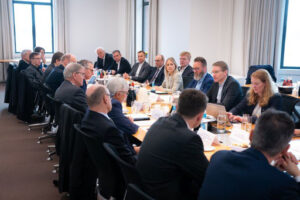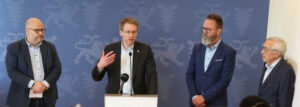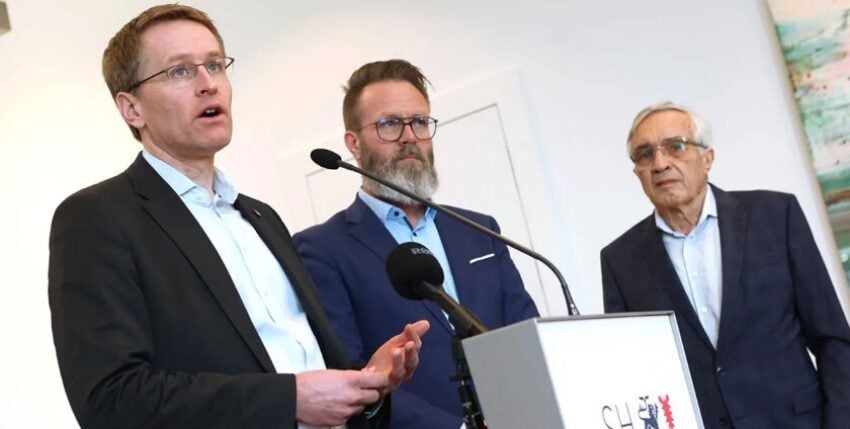Defence technology summit with Prime Minister Günther
The defence technology industry in Schleswig-Holstein is an important part of the German armaments base with around 30 efficient companies employing around 8,500 people. The business activities are broadly diversified with naval shipbuilding, the land systems and aviation industry as well as the communications, weapons and ammunition systems, sensor, optics and optronics industries.

Naval shipbuilding is of particular importance to security and industrial policy in Germany's northernmost federal state. With 16 companies and 5,300 people directly employed in defence technology, it is the largest sector. With surface and underwater shipbuilding, it has key defence technologies and core capabilities that cannot be dispensed with for security, industrial and alliance policy, technological and defence industry reasons. The special technological expertise is also characterised by the ability to fulfil complex system requirements.
The Russian invasion of Ukraine, which began on 24 February 2022 in violation of international law, and the mandates for action announced in Chancellor Olaf Scholz's speech on 27 February 2022 are having an increasing influence on the future direction of the defence industry in Schleswig-Holstein. The state government has recognised the nationwide importance of this industry. Back in December 2022, Minister President Daniel Günther hosted the first defence technology summit, at which the effects of the turnaround speech on the defence industry were discussed.
Following this first defence technology summit, the Minister President emphasised the importance of naval shipbuilding in a letter to Federal Chancellor Olaf Scholz: "In certain high-tech areas, such as air-independent propulsion systems, underwater weapons, unmanned underwater vehicles and underwater sensors, surface shipbuilding, corvettes and frigates, armoured vehicles and state-of-the-art aviation equipment, companies from Schleswig-Holstein hold a leading position worldwide." He also pointed out that maintaining a strong German naval shipbuilding industry is of essential importance for Germany, particularly in terms of security policy.

On 15 March 2024, Minister President Günther invited the defence industry to another defence technology summit in order to "continue to support and accompany their concerns at various levels". This meeting was again attended by high-ranking representatives of the defence industry, the UV Nord business association, the trade unions and the Kiel Chamber of Industry and Commerce "There are steps in the right direction," Günther said by way of introduction, "but so far there has been no real paradigm shift".
The participants discussed the previously prepared draft of a position paper. Finally, "A position paper against the backdrop of the Russian war of aggression on Ukraine in violation of international law" was adopted and presented at the subsequent press conference (www.schleswig-holstein.de/wehrtechnikgipfel).
The initial situation described in the paper is determined by Germany's security and defence policy challenges, in particular the Russian war of aggression against Ukraine in violation of international law, and has a significant impact on the defence industry. These are described for the naval, land and air systems industries as well as for suppliers, and the effects of the 100 billion euro special Bundeswehr fund, the restrictive arms export regulations and the industry's financing problems are discussed in particular.
A representative survey previously carried out by the Schleswig-Holstein Defence Technology Working Group, in which 20 Schleswig-Holstein companies with 90 percent of defence technology employees took part, underpins the statements on the situation in the defence industry. From the naval shipbuilding sector, 10 companies with 90 per cent of defence technology employees took part in the survey. This concerned personnel development, the effects of the 100 billion euro special fund on business development, support services for Ukraine as well as the problems caused by the restrictive German defence export regulations and the problems caused by the ESG taxonomy in financing the companies.
All-time high for defence technology employees
In the last financial year, companies in Schleswig-Holstein recorded an overall increase of 10 per cent to around 8,500 in the number of people directly employed in defence technology compared to the previous year, meaning that the defence technology industry in Schleswig-Holstein has reached an all-time high. However, this strong growth, caused by the changed security policy situation, in particular the war in Ukraine, varies greatly from sector to sector. It is disproportionately high in the land systems industry at 22 per cent, compared to 6 per cent in naval shipbuilding. As in other sectors, the significant shortage of skilled labour, particularly in some occupational fields, continues to be a problem in the defence industry.
Following the summit, Daniel Friedrich, District Director of IG Metall Küste, said: "Defence technology in Schleswig-Holstein predominantly stands for good industrial jobs with collective agreements and co-determination. We welcome the fact that the state government is focussing more on the industry and its employees. In addition to clarity about orders, we expect an active industrial policy that secures value creation and jobs in Germany, but also keeps an eye on European partnerships. Naval shipbuilding is also about safeguarding the country's maritime assets. Ultimately, it is still about returning to peaceful coexistence in Europe."
Special assets of the Bundeswehr
The 100 billion euro special fund announced two years ago by Chancellor Scholz in his "turnaround speech" on 27 February 2022 has not yet resulted in any significant incoming orders for companies in Schleswig-Holstein. The special fund has only made a small contribution to incoming orders so far, but is making an increasing contribution in the land systems industry.
The fact that procurement projects for naval shipbuilding have fallen far short of expectations and planning is very disappointing. To date, this sector has only been able to participate in the special fund to a limited extent. According to Minister President Günther in his statement, the German Navy has considerable requirements that could be covered by the shipyards and supplier companies in Schleswig-Holstein. "The federal government must provide sufficient, long-term funding in the federal budget as well as sufficient personnel capacity for this."
Extensive support for Ukraine
The increase in personnel in the defence technology industry is largely determined by support services for Ukraine, particularly in the land systems industry, in which naval shipbuilding is not significantly involved. These are financed by funds from the German government's defence upgrading aid or from partner states. Extensive maintenance activities and training support are associated with the deliveries by the German Armed Forces and allied armed forces as well as industry.
Two per cent target
In the turnaround speech, it was announced that the considerable equipment shortfalls would be remedied through the special fund and with the commitment to spend two percent of economic output on defence. This two per cent target for the current financial year could only be achieved with accounting fantasy. It is essential for companies that it is made clear how sustainable financing of the Bundeswehr and compliance with the two per cent commitment made in the alliance is to be achieved after 2027, i.e. after the special fund expires.
Minister President Günther expects that the special assets of the Bundeswehr and the increase in the defence budget will create more predictability and reliability for these companies.
Restrictive arms export regulations
For the defence technology industry, foreign markets have become much more important due to the global change in the security policy situation, although the restrictive arms export regulations represent a significant obstacle. In naval shipbuilding, too, most companies in Schleswig-Holstein, with a total of around 80 per cent of defence technology employees in the survey, state that they still have more or less major problems in obtaining arms export licences. The "restrictive basic line" of German arms export policy that continues to be pursued in the National Security Strategy, particularly in relation to so-called third countries, hinders the politically demanded defence cooperation, weakens the competitiveness of the German defence technology industry, puts companies in an internationally marginalised position and leads to the loss of key technologies.
Financing problems with defence contracts
Six companies in the naval shipbuilding sector, which employ a good 80 per cent of the workforce, are having problems financing defence orders. "It is unacceptable," said Economics Minister Claus Ruhe Madsen at the Defence Technology Summit, "that defence technology companies make a significant contribution to securing peace and freedom in Europe on the one hand, but have difficulty obtaining loans on the other.
Defence technology companies are demanding that defence and its products, which serve our security and are always manufactured and exported with the approval of the German government, be declared sustainable. The discriminatory ESG (Environment, Social, Governance) regulations of the EU Commission, also known as the taxonomy, which categorise the defence industry as "unsustainable" and "socially harmful" and thus increasingly deny companies access to the credit market, must therefore be abolished.
Conclusion
The Schleswig-Holstein state government is committed to the security and industrial policy importance of the defence industry and actively supports it in its concerns. This defence technology summit is in line with the broad-based activities of the state government, such as the constructive dialogue between the defence industry and the banking industry convened in June 2023 and the proposed resolution by the state's Ministry of Economic Affairs on "Supporting defence technology", which was broadly approved by the other states at the Conference of Economics Ministers on 8 November 2023.
The Schleswig-Holstein state parliament also addressed the issue of improving the framework conditions for the defence technology industry in 2023 under the heading "Supporting Schleswig-Holstein's defence technology". Due to the security policy challenges, these are clear signs of accompanying political support for defence technology companies and a strategically coordinated approach between politics and industry.
Dieter Hanel is a member of the board (spokesman) of the Schleswig-Holstein Defence Technology Working Group and author of the book "Bundeswehr und Verteidigungsindustrie. Security and Technology in Schleswig-Holstein"
Dieter Hanel










